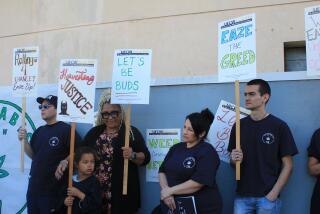Harrison Trash Haulers Threaten Strike
- Share via
Workers at Ventura County’s largest trash-hauling company have threatened a strike if they can’t resolve outstanding pay and productivity issues in their first labor contract.
E.J. Harrison & Sons, with more than 70,000 commercial and residential customers from Newbury Park to Carpinteria, has been negotiating since July with representatives of the United Food and Commercial Workers Local 1036.
The workers rejected for a second time the company’s contract offer and voted earlier this month to walk off the job. But union leaders agreed to a federal mediator’s request that they meet with the company Friday for a final attempt to reach an agreement. A strike could begin the next day.
Last week, Harrison officials sent letters to the cities it serves, saying the company has bargained in good faith and plans to do “everything we possibly can to reach an agreement and prevent a work stoppage.” But if a strike occurs, the company is “very prepared to continue providing uninterrupted service.”
Vicki Musgrove, maintenance services manager for the city of Ventura, said she will meet with Harrison representatives this week to ensure that the company can continue to haul away garbage from its 24,000 customers in the city. “Our contract says we can do whatever it would take to make sure that our citizens are protected,” she said.
Drivers and other company employees joined the union last April, after the company essentially lowered wages by restructuring some routes and reducing certain incentive pay and bonuses.
“When you take up to $200 away from a driver’s weekly paycheck, you affect their house payment, their car payment and maybe tuition for a child in college,” said Martel Fraser, secretary-treasurer of the union. “I have wanted to resolve this. I don’t want people’s trash sitting [outside] for two weeks.”
Local 1036 represents 12,000 employees at grocery and drug stores and health-care workers in six counties from Ventura to Inyo. “This is our first set of truck drivers,” said Fraser, who directs the Harrison workers’ bargaining team. “And the first contract is always extremely difficult.”
At issue is a management proposal to increase the number of homes served on each route, now an average of 800 to 900 per day. The company maintains a driver working in Ojai or other distant areas may visit only 800 homes, but that a driver serving Ventura -- closer to the company’s headquarters there -- should be able to handle as many as 1,050 barrels of trash each day.
“The guys who are closer in have considerably more time, maybe two hours a day more, than the guys who are in, say, Newbury Park,” said Lynn Harrison, sales and service manager, who has helped bargain for the company. “We have better equipment than we’ve had before.”
But the union said such a workload is unreasonable. At 800 homes, a driver needs to handle 100 barrels of trash hourly during an eight-hour shift. At 1,050 pickups, that’s 131 barrels an hour, or one every 27 seconds.
The union wants time-and-a-half for those working more than eight hours, but the company pays its drivers based on a federal Department of Transportation formula that results in lower hourly pay the longer a person is at work.
Harrison’s 86 drivers receive a flat $150 a day -- which the company has offered to increase by 75 cents, Fraser said -- so a straight eight-hour shift works out to $18.75 an hour. But if it takes a driver 10 hours to pick up the trash, the pay is effectively $15 per hour. The company pays overtime at 50% of this recalculated rate, or $7.50 per hour, for total daily pay of $165.
The parties also disagree on establishing a yearly tool allowance for mechanics. The union originally asked for $500; the company’s current offer is $50 a year after 10 years of service.
The company has agreed to reduce employee costs for medical coverage. A worker with two or more dependents now contributes $35.38 each paycheck.
Harrison would further subsidize that amount, so premiums would fall in each of the contract’s three years to as little as $3.28 per week, although the amount could be increased by $10 weekly if health-care costs rise.
More to Read
Sign up for Essential California
The most important California stories and recommendations in your inbox every morning.
You may occasionally receive promotional content from the Los Angeles Times.










